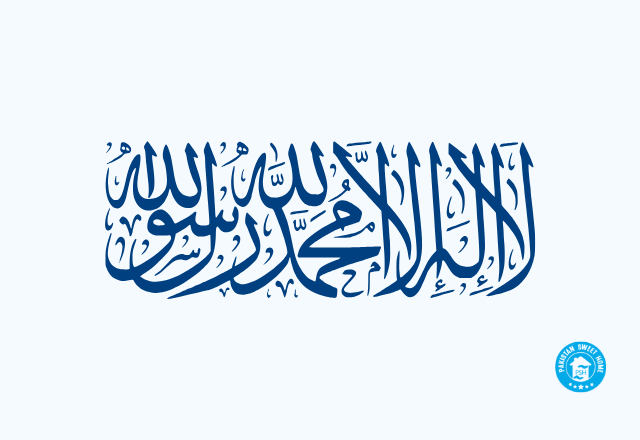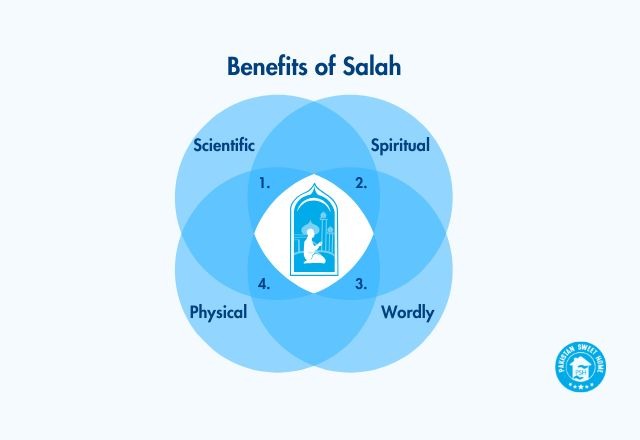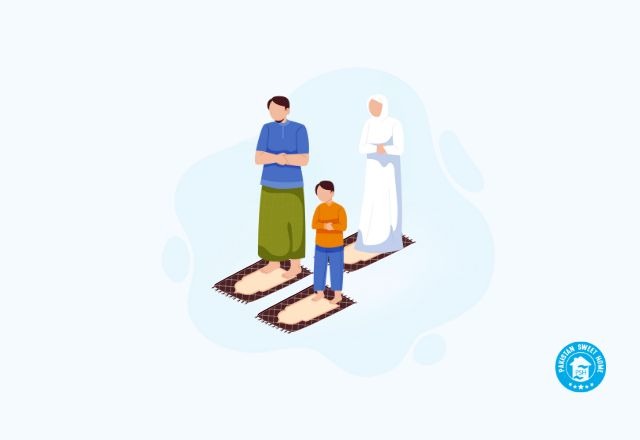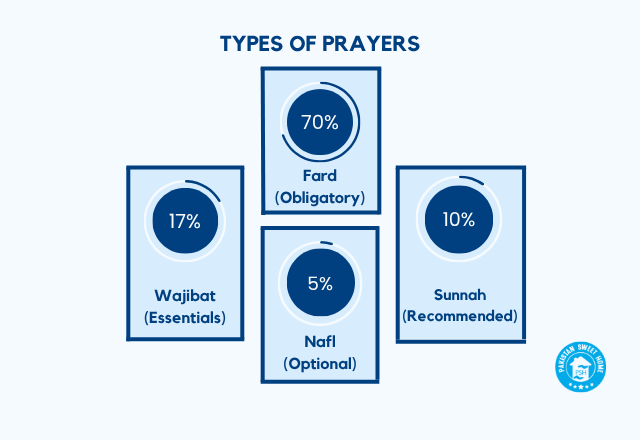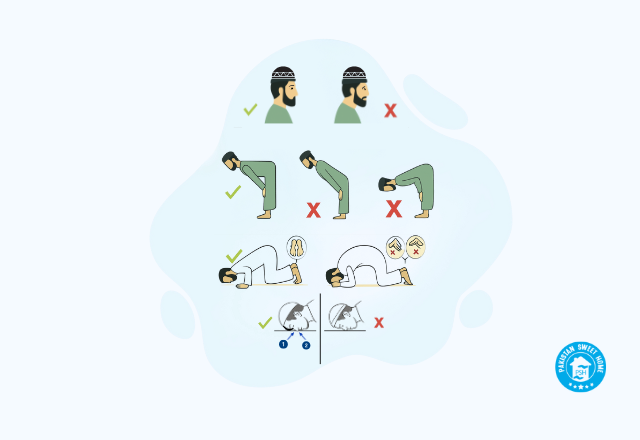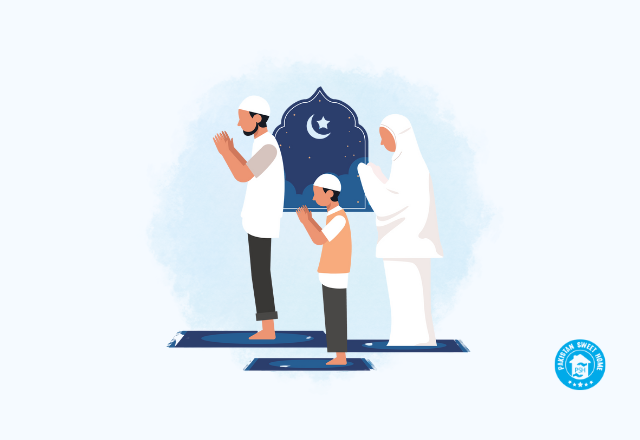Salah is the obligatory Islamic prayer performed five times daily, serving as a direct connection with Allah.
It is the second pillar of Islam and is obligatory for Muslims. Salah connects the believer to Allah, teaches discipline, and cleanses the soul. Yet many Muslims struggle with consistency, often missing prayers or rushing through them without focus or reflection.
This neglect leaves the heart unsettled, weakens spirituality, and distances the believer from Allah’s guidance. Rediscovering the purpose of Salah helps transform it from a routine task into a source of peace and strength.
Let’s study the Salah prayer in detail, including its meaning, importance, steps, benefits, common mistakes, and special situations.
Meaning of Salah Prayer
The word Salah (صلاة) in Arabic literally means connection, supplication, or prayer. In Islam, it refers to the formal, prescribed act of worship performed five times daily at specific times.
Salah is more than physical movements; it is a direct conversation between the believer and Allah. Through standing, bowing, and prostrating, Muslims show humility, gratitude, and submission to their Creator.
It reminds Muslims of their purpose in life, cleanses the heart from sins, and provides spiritual discipline. Unlike personal du‘a (supplication), Salah follows a structured format revealed by Allah and taught by the Prophet Muhammad (ﷺ).
What Is the History of Salah Prayer?
The history of Salah goes back to the time of Prophet Muhammad (ﷺ). Before the command of five daily prayers, Muslims prayed in simpler forms of worship, such as remembering Allah and reciting Qur’anic verses.
The obligation of Salah was established during the Night Journey (Isra and Mi’raj). It was a miraculous event where the Prophet (ﷺ) was taken from Makkah to Jerusalem and then ascended to the heavens.
There, Allah initially prescribed 50 daily prayers, but through the Prophet’s repeated appeals, it was reduced to five prayers, with the reward equal to fifty. This event shows the central place of Salah in Islam.
After this command, Muslims began performing Salah regularly at fixed times. The Prophet (ﷺ) taught his companions the exact words, positions, and manners of prayer, and they preserved them through continuous practice. Since then, Salah has been observed without change, passed down through generations of Muslims.
Salah also connects to earlier prophets. The Qur’an mentions that prophets like Ibrahim (Abraham), Musa (Moses), and Isa (Jesus) encouraged prayer. This shows that Salah is part of the same divine tradition of worship, perfected in Islam.
The love for Salah was so deep that the Prophet Muhammad (ﷺ) described it as the comfort of his life.
He said, “The coolness of my eyes has been placed in Salah.”
(Sunan an-Nasa’i 3940)
This shows that beyond obligation, Salah was a source of joy, peace, and spiritual fulfillment for him, and serves the same purpose for Muslims today.
What Are the Prerequisites (Before You Pray)?
Before starting Salah, certain conditions must be met to ensure the prayer is valid and accepted.
1. Be Muslim & Intent (Niyyah)
Salah is an obligation only for Muslims, and faith is its foundation. A silent intention in the heart confirms which prayer is being offered, keeping the act sincere and purposeful.
2. Ritual Purity (Wudu or Ghusl if Needed)
Cleanliness is essential in Islam, and prayer requires a state of ritual purity. Performing wudu involves washing specific parts of the body, while ghusl is needed after major impurity, like sexual relations or menstruation. If wudu is broken, it must be renewed before resuming Salah.
3. Clean Clothes and Place
Islam emphasizes both inner and outer cleanliness during worship. Clothes must be free of impurities, and the prayer spot should not contain filth. Even a small impurity can invalidate prayer if left uncleaned.
4. Facing the Qiblah
Muslims around the world face the Kaaba in Makkah during Salah. This direction, called the Qiblah, symbolizes unity and shared devotion. Wherever possible, a compass, app, or mosque indicator helps identify the Qiblah correctly.
5. Perform Within the Fixed Time
Every prayer has a specific start and end time set by Shariah. Praying within this time window is obligatory; delaying without a valid reason makes the Salah invalid. Prayer apps, mosque announcements, and Islamic calendars help Muslims stay punctual.
Why Is Salah Important in Islam?
Salah is not just a daily ritual; it is the backbone of faith.
The Prophet Muhammad (ﷺ) said: “The first matter a servant will be brought to account for on the Day of Judgment is the prayer.”
(Sunan al-Tirmidhi 413)
He (ﷺ) also said: “Between a man and shirk (polytheism) and kufr (disbelief) is the abandonment of Salah.”
(Sahih Muslim 82)
Another narration states: “Whoever guards his prayers, they will be light, proof, and salvation for him on the Day of Resurrection. Whoever does not guard them will have no light, no proof, and no salvation, and on the Day of Resurrection, he will be with Qarun, Fir‘awn, Haman, and Ubayy ibn Khalaf.”
(Musnad Ahmad 6576)
The Prophet (ﷺ) described Salah as the comfort of his soul: “The coolness of my eyes has been placed in Salah.”
(Sunan an-Nasa’i 3940)
He (ﷺ) also said: “The five daily prayers and Friday to Friday are expiation for what is between them, as long as major sins are not committed.”
(Sahih Muslim 233)
Together, these narrations emphasize that Salah is the foundation of faith and the very first deed judged. It acts as a shield against sin, a source of forgiveness, and the true comfort of a believer’s life. Abandoning it leads to spiritual ruin, while preserving it brings light, guidance, and salvation.
What Are the Benefits of the Salah Prayer?
Salah is more than a ritual; it is a source of countless spiritual, emotional, and physical benefits for Muslims.
- Direct Connection with Allah: Salah allows Muslims to speak directly with their Creator without intermediaries.
- Reminder of Purpose: It reminds believers that life is temporary and true success lies in serving Allah.
- Spiritual Purification: Salah washes away minor sins and protects from greater wrongdoings.
- Discipline and Structure: Praying five times daily creates balance, routine, and discipline in life.
- Unity of the Ummah: Muslims around the world pray in the same direction, strengthening community and equality.
- Inner Peace and Relief: Regular prayer brings calmness, reduces stress, and gives emotional stability.
Without Salah, faith weakens. With Salah, belief grows stronger and life gains direction.
What Are the Five Daily Prayers and Their Rakat?
Here are the obligatory (fard) prayers with their units:
Prayer | Name | Rakaats (units) |
Dawn | Fajr | 2 |
Noon | Dhuhr | 4 |
Afternoon | Asr | 4 |
Sunset | Maghrib | 3 |
Night | Isha | 4 |
In addition to the fard prayers, there are Sunnah (voluntary but recommended) prayers, Witr, Tahajjud, Taraweeh in Ramadan, etc.
How to Pray Salah?
One rak‘ah (unit) of Salah includes:
- Takbir (saying Allahu Akbar)
- Qiyam (standing and reciting Qur’an)
- Ruku (bowing)
- I’tidal (standing after bowing)
- Sujud (prostration)
- Jalsa (sitting between prostrations)
- Second Sujud
- Tashahhud & Durood (in final sitting)
- Tasleem (ending with Salam)
Repeat according to the required raka‘at for each prayer.
What Are the Obligatory Acts & Acts That Nullify Salah?
To ensure Salah is valid, certain acts must always be performed, while others can break the prayer if done incorrectly.
Obligatory Acts (Arkan / Fard)
A few key obligatory parts include:
- Intention (niyyah) quietly
- Standing (for those who can) in prayers of more than one rakaah
- Reciting Al-Fatiha in each raka‘ah
- Ruku with humility
- Two prostrations
- Sitting for Tashahhud
- Final salutations (Tasleem)
- Continuity (not inserting extra steps that invalidate)
Acts That Invalidate Salah
Some invalidators include:
- Speaking intentionally out loud during prayer
- Laughing
- Turning away from Qiblah
- Losing ablution (if broken)
- Omitting a pillar without doing prostration of forgetfulness (sujood as-sahw) when needed
Also, if one forgets something, there is sujood as-sahw (prostrations of forgetfulness) to compensate.
Common Mistakes and How to Fix Them
Even with good intentions, many people make small mistakes during Salah. Being aware of them helps improve focus, sincerity, and correctness in prayer.
- Rushing: Move slowly and with presence; don’t hurry each posture.
- Weak attention (Khushu’): Focus on the meanings of words; reduce distractions.
- Skipping Sunnah: Try to maintain the prophetic recommended prayers to strengthen the habit.
- Wrong recitation or pronunciation: Learn Arabic phrases, listen to recordings, and practice.
- Improper posture: Ensure a straight back in ruku, full prostration touches, and eyes down in sujud.
How to Build Consistency and Love for Salah?
Praying five times daily can feel challenging at first, but with the right approach, it becomes natural.
Here are practical ways to develop consistency and deepen your love for Salah:
1. Schedule Around Prayer, Not Vice Versa
Instead of squeezing Salah into your routine, plan your day around prayer timings. This approach ensures that Salah stays your top priority, not an afterthought.
2. Use Reminders & Apps
Technology makes it easier to stay on track. Set alarms or install Islamic apps that notify you when it’s prayer time, especially during busy schedules.
3. Understand Meaning & Purpose
Learn the translation of Surah Al-Fatiha and other recitations you say in Salah. When you understand the meaning, the words touch your heart and increase focus.
4. Start Small, Be Realistic
If you struggle, begin with just one or two prayers consistently. Gradually add more until all five prayers become part of your daily lifestyle.
5. Pray in Congregation
Praying in a mosque or with others increases reward and motivation. It also brings a sense of unity and strengthens your bond with the community.
6. Seek Accountability & Community
Find prayer partners, attend study circles, or join mosque programs. Having others remind and support you builds accountability and makes prayer easier to maintain.
7. Renew Your Intention Daily
Every day, remind yourself that Salah is a meeting with Allah. This keeps the act fresh, sincere, and more than just a repeated routine.
Salah in Special Situations
Life circumstances sometimes make it hard to perform Salah exactly on time or in the usual way. Islam provides flexibility in such cases, allowing worship to remain possible and practical for every believer.
Missed Prayers
If you miss a prayer, perform it as soon as you remember. Delaying intentionally is sinful, but making up prayers (Qada) keeps your record complete and sincere.
Illness / Incapacity
If you can’t stand, you may pray sitting on a chair or the floor. If even sitting is difficult, gestures with the head or eyes are enough to keep the spirit of Salah alive.
Travel
While traveling, Muslims may shorten Dhuhr, Asr, and Isha from 4 rakaats to 2. This concession, called Qasr, eases hardship and ensures Salah remains manageable during long journeys.
Special Types of Salah
In addition to the daily obligatory prayers, Islam prescribes unique prayers for specific events and occasions.
Solar and Lunar Eclipse Prayers
During rare events like a solar or lunar eclipse, Muslims are encouraged to perform Salat al-Kusuf (solar) and Salat al-Khusuf (lunar). Both prayers consist of two raka‘at, but each rak‘ah includes two standing (qiyam), two bowings (ruku), and two prostrations (sujood). This unique structure reminds Muslims of Allah’s greatness and power over the sun and moon.
Salat al-Janazah (Funeral Prayer)
The funeral prayer, called Salat al-Janazah, is performed for a deceased Muslim before burial. Unlike regular Salah, it has no ruku (bowing) or sujood (prostration); it is offered while standing.
It consists of four takbirs:
- First takbir, recite Surah Al-Fatiha.
- Second takbir, recite Salat al-Ibrahimiyya (Durood).
- Third takbir, make du‘a for the deceased.
- Fourth takbir, conclude with Tasleem (saying Salam).
This prayer is a collective obligation (fard kifayah), meaning that if some Muslims perform it, the duty is lifted from the rest.
In conclusion, Salah is the heart of Islamic worship, defined as a daily prayer that connects Muslims directly with Allah. Its meaning goes beyond ritual movements, serving as a reminder of purpose, humility, and submission.
Prerequisites such as purity, clean clothes, facing Qiblah, and praying on time ensure the act is valid and sincere. Its importance lies in discipline, forgiveness, unity, and peace, making it a cornerstone of faith. The five daily prayers, with their fixed raka‘at, guide a believer’s routine and structure each day.
Learning the step-by-step process of Salah, along with its obligatory acts, keeps prayer correct and protected from invalidation. Avoiding common mistakes and building consistency with reminders, understanding, and congregation strengthens devotion.
Finally, Islam’s flexibility allows Salah in special situations, whether missed, during travel, illness, an eclipse, or even at a funeral. This proves its role as an ever-present act of worship in every circumstance of life.
At Pakistan Sweet Home, a true home for orphans, children are nurtured with care, education, and love. Alongside academics, they are guided to practice Salah, building discipline and faith in their daily lives. This blend of spiritual and worldly support helps them grow into confident, compassionate, and responsible Muslims.
Make an Orphan Smile and Pray for You

info@pakistansweethome.org.pk
(051) 4865856
+92 335 1118477






